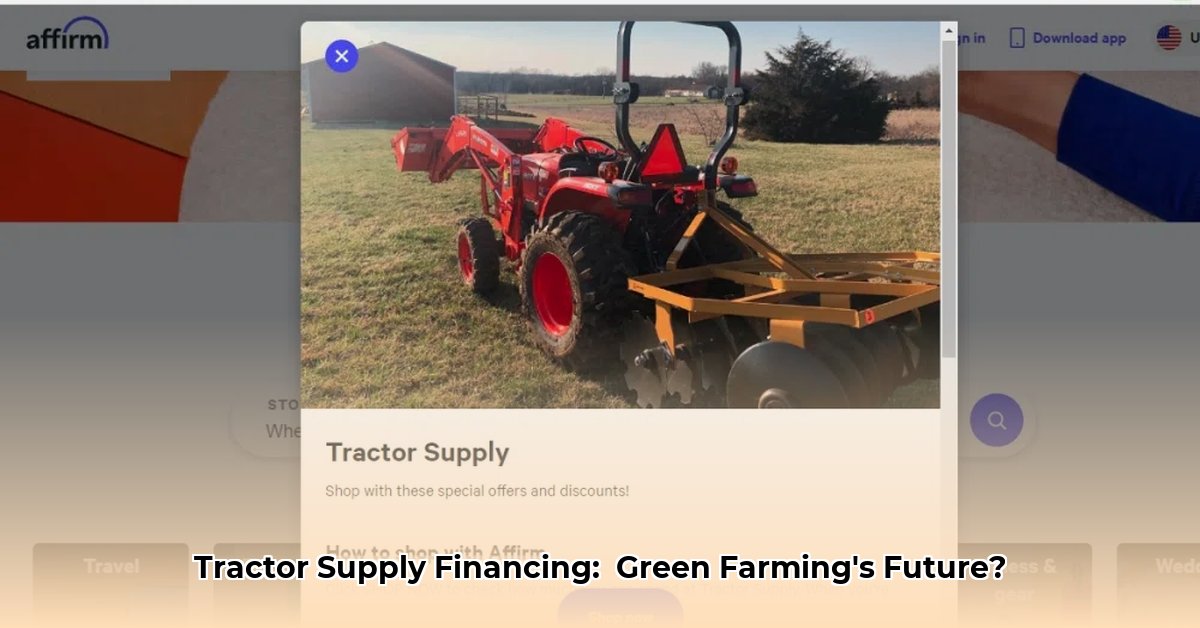
Could Buy Now, Pay Later Boost Sustainable Farming?
Tractor Supply Company (TSC), a major supplier of agricultural equipment and supplies, has not yet partnered with Affirm, a prominent buy now, pay later (BNPL) provider. This absence of collaboration presents a significant hurdle for smaller farms seeking to adopt sustainable farming practices. The high initial costs associated with sustainable technologies, such as smart irrigation and renewable energy systems, often prohibit smaller operations from making necessary upgrades. The potential integration of Affirm’s BNPL services into TSC's offerings could be transformative for sustainable agriculture. For more information on TSC's policies, see their return policy.
The High Cost of Sustainable Farming Practices
Sustainable farming methods, while crucial for long-term land health and profitability, demand substantial upfront investments. The cost of implementing technologies like precision irrigation, renewable energy sources, and soil-enriching techniques presents a significant barrier for many smaller farms. This financial constraint can lead to delays or abandonment of crucial upgrades that impact both productivity and environmental responsibility. Access to flexible financing options, such as those offered by BNPL services, is vital to overcome this hurdle.
Why TSC's Partnership with Affirm Remains Unconfirmed
TSC's reticence to partner with Affirm is likely due to a multitude of factors. Concerns about increased fraud risk associated with BNPL services are understandable given the elevated risk inherent in such systems. Furthermore, technological incompatibility between TSC's existing payment infrastructure and Affirm's platform could require significant investment and integration efforts. Finally, the fees charged by Affirm might prove less cost-effective than TSC's established payment processing methods. Without concrete data from TSC, these remain speculative yet plausible explanations. A comprehensive cost-benefit analysis would be crucial in elucidating TSC’s decision-making process.
The Impact on Key Stakeholders
The absence of an Affirm-TSC partnership has far-reaching effects on various stakeholders within the agricultural ecosystem:
Small Farms: Limited access to flexible financing severely restricts their ability to adopt essential sustainable practices. This financial constraint directly impacts productivity and long-term farm viability. For example, a farmer needing a new water-efficient irrigation system might be unable to afford it without BNPL options, hindering their ability to conserve water and improve efficiency.
Tractor Supply Company: By not offering BNPL, TSC may lose potential sales to customers who prefer this payment method, driving them to competitors offering more flexible purchasing options. This represents a lost opportunity for market share expansion and revenue growth.
Sustainable Agriculture Advocates: Organizations promoting sustainable agriculture rely on farmers' ability to access the necessary financing for environmentally friendly technologies. The lack of accessible BNPL options directly hinders their efforts to promote widespread adoption of sustainable practices.
BNPL Companies (like Affirm): The agricultural sector presents a large, untapped market for BNPL services. Tailoring services to meet the specific needs of farmers could create a substantial new revenue stream for companies like Affirm.
Potential Solutions and Strategies
Several strategies could facilitate the adoption of sustainable farming practices by leveling the financial playing field:
TSC's Comprehensive Cost-Benefit Analysis: A thorough cost-benefit analysis by TSC is crucial to determine the financial viability of partnering with Affirm. A pilot program could mitigate risk by testing the partnership on a smaller scale before full integration.
Government Subsidies and Loan Programs: Government agencies can play a vital role by offering targeted subsidies and loan programs specifically designed to support sustainable farming practices. This would directly address the high upfront cost barrier for farmers.
Enhanced Lending from Financial Institutions: Local banks and credit unions can develop specifically designed loan products tailored to the needs of smaller farms, making sustainable technology more accessible.
Advocacy for Accessible Financing: Sustainable agriculture organizations can advocate for policy changes promoting more accessible financing options and lobby for impactful legislation supporting farmers' financial needs.
Risk Assessment and Mitigation
The potential benefits of an Affirm-TSC partnership must be carefully weighed against associated risks:
| Factor | Risk Level | Potential Impact | Mitigation Strategies |
|---|---|---|---|
| Increased Fraud (with BNPL) | Medium to High | High | Robust fraud detection systems, thorough customer vetting |
| Limited Access to Capital | High | High | Government loans, alternative financing |
| High Upfront Costs | High | High | Subsidies, leasing programs, flexible financing plans |
The need for robust mitigation strategies is paramount to minimize potential risks. The future of sustainable agriculture hinges on ensuring farmers have access to appropriate financial tools. An Affirm-TSC partnership could prove to be a substantial step toward achieving this goal. The question remains whether TSC will seize this compelling opportunity.
Securing Financing for Sustainable Farming Equipment: A Practical Guide
This section will be expanded in future revisions to include the detailed guide on securing farming equipment financing as per the draft. The initial analysis has shown that a combination of traditional bank loans, government programs and online lenders offer several choices.